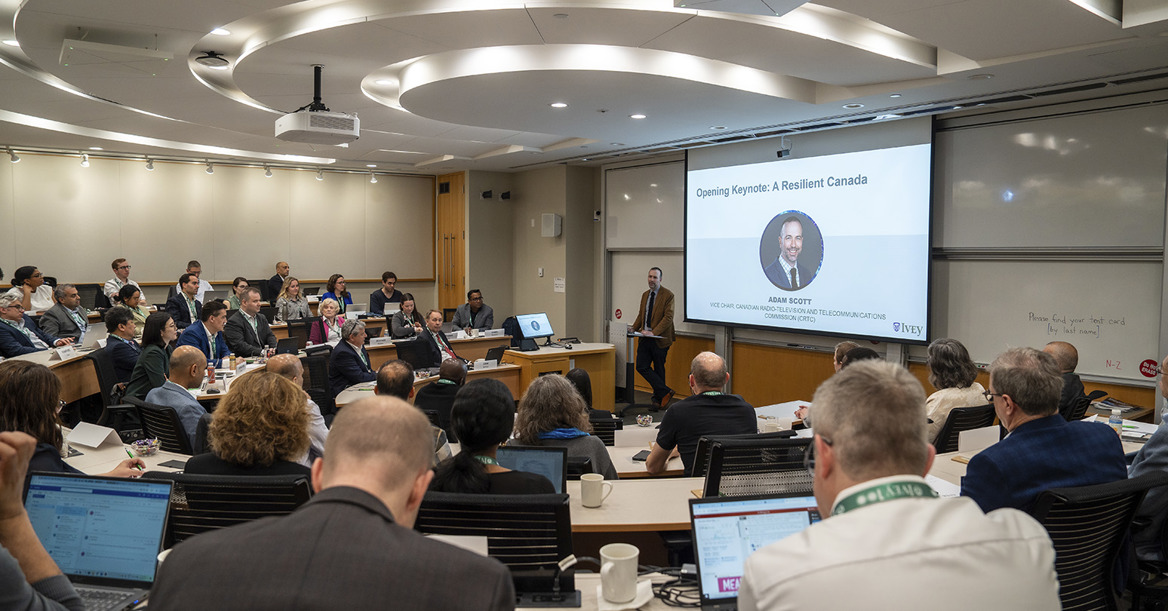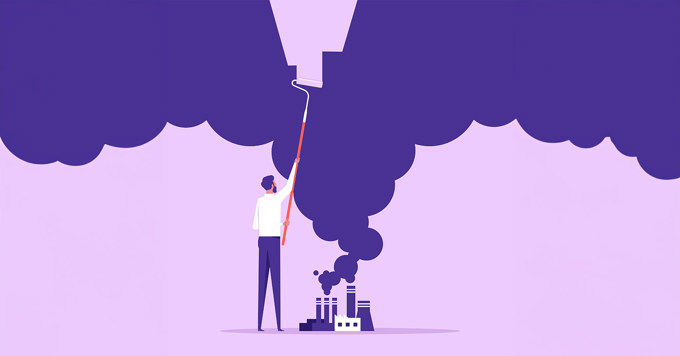The vast majority of Canadians take access to telecom services for granted. Whether it’s talking on the phone, or endlessly scrolling social media platforms, it’s almost always there at the touch of button. What is also true, are the systems and infrastructure that make up global telecom networks are constantly under attack and threat. Their resilience is being tested all the time.
A recent workshop hosted by the Ivey Business School’s Lawrence National Centre for Policy and Management gathered telecom policymakers, industry representatives, and researchers to address the growing importance of resilience in the face of challenges, such as climate change, geopolitical tensions, and malicious actions.
Professor Erik Bohlin, who holds Ivey’s Chair in Telecommunications Economics, Policy and Regulation, helped to guide the workshop discussion. As an expert in telecom policy, Bohlin spoke with Ivey Impact about the major themes from the session, emphasizing why creating resilient telecom networks is a top priority.
What are some of the most pressing issues facing the Canadian telecom sector today?
Building resilience is central to the telecom industry now. The Canadian government has made several recent initiatives: Bill C-26 is debated in Parliament and includes, among others, a reformulation of the 1993 Telecom Act to include resilience as a fundamental objective; Innovation, Science and Economic Development Canada has a number of telecom reliability initiatives, including a memorandum of understanding with industry, an agenda for action, various committees engaging a broad range of digital players, further attention to cyber security, and new instructions to CRTC; and CRTC has now the goal to improve resilience in the Canadian telecom system.
There are many threats to resilience, and not just collisions with nature, such as wildfires, flooding, and hurricanes, but also more direct maligning activities by humans. Protecting against these threats cost money, both in terms of investment but also in terms of maintenance and operational expenditures. As we all know, Canadian telecoms are under huge pressure to reduce rates to users, and while this is taking place at increasing speed, the need for resilience will provide an upward pressure on rates. The government will need to create incentives for building resilient networks, together with the concern for reduced rates.
Your workshop focused on the need to create a resilient telecom sector. What does "resilience" mean in this context?
Resilience means to withstand pressures, threats, and bad events from three categories: chance natural events; natural events influenced by human-made conditions; and finally maligning acts by humans to destroy or reduce functionality of telecom networks. It is not just about chance events, such as bad luck with the weather – as we are very much aware, climate changing activities by humans are very much influencing our everyday lives and posing entirely new pressures on infrastructure, including telecommunications. And there are many potential maligning actors, ranging from pure sabotage (such as cutting telecom lines), theft (for instance copper lines), and cyber intrusions and hacking. A particular variant of maligning actions relates to the changing geopolitical landscape where state-sponsored hacking and intrusions are taking place. It seems increasingly clear that we are not aware yet of all the state-sponsored activities that are taking place by states, which do not have a favorable or friendly view of Canada. Attempts to influence democratic elections are just one example of this.
It sounds like the global system is under constant threat – who is responsible for the safety of the system?
Traditionally, the safety and security of telecommunication systems have resided with the telecom operators in charge, and that has typically been private actors. It has been commonplace that government organizations contracted private entities to provide resilient services, for instance for the military. Increasingly, there is a realization that governments need to be more involved in investing in telecom networks for resilience. Funding is being increasingly made available, not just for broadband in remote areas, but also for resilience.
Nearly two years ago, one major Canadian carrier experienced a catastrophic blackout. Have you seen measures come into place to help prevent this? What did the industry as a whole learn?
Canada is not alone when it comes to telecom blackouts. Moreover, with the globalization of the equipment markets and networks provision, it is increasingly important that manufacturers have standardized quality control and care. In fact, many of the telecom operators are delegating to original equipment manufacturers to run their networks. It is then paramount that the actual agent running the network is completely in control of the technologies. There are hand-over situations between the regular telecom operator and the firms that have delivered the actual network equipment. As far as I have understood, it was precisely this hand-over between Rogers and the global manufacturer that led to the setting off of the so-called Rogers outage. From the government side, as these operations are so far removed from their activities, the reaction has been to call for increased reporting and notification procedures in times of a potential outage. Government is essentially reactive here.
Are you optimistic stakeholders are willing to make the necessary investments to maintain the safety and stability of the telecom sector?
As mentioned above, there are indeed tensions between the need to invest and incentives to invest. To simplify, resilience is an issue that goes beyond the individual firm, and involves so-called externalities. Investing in resilience will benefit larger groups than just the firms involved and their customers. Increased resilience will benefit society, and also in non-monetary terms. So, with externalities present, government has to step in to either provide funding or to provide positive incentives for firms to invest in greater resilience.
While this wasn’t part of the theme of the workshop, Canadians frequently complain about the cost of cellphone plans – why is the cost so much higher in Canada, compared to Europe?
The Canadian telecom prices have indeed started to come down, as recently reported by the Prime Minister. There are several factors contributing to differences to Europe. The obvious one is landmass and population density in Canada. Another factor is the difference in approach toward infrastructure competition versus unbundled networks. Both the United States and Canada chose an early path for infrastructure competition, as both countries had extensive cable TV and telecommunications networks, while Europe did not. So Europe chose an unbundled or open access regime. Prices are generally lower in Europe than both North American countries for this reason. However, both Canada and Europe are pretty similar in terms of mobile access. Both have a mixture of both infrastructure competition, sharing of networks, and mandated access, and you find both virtual mobile players in Europe as in Canada, i.e. mobile providers who do not own telecom networks but just rent space in other networks. It is generally recognized in Europe that investments are lower than desired – creating an investment gap. Currently, there is a generally published estimate of $150 billion Euro investment shortage, or more than $200 billion CAD.
Considering resilience, as described above, significant investments are needed to secure the necessary levels of protection. Canada has not been challenged in the same way on investment drought, and may in fact, lay ahead of Europe. Even so, there may be a need for more harmonized and consistent emergency responses across provinces and territories by government and industry, with additional government support for network resiliency. A resilience comparison between Canada and Europe awaits future research and analysis, and is an interesting topic moving forward.
The Ivey Telecom Workshops are co-funded by the Lawrence National Centre for Policy and Management and the Ivey Chair in Telecommunication Economics, Policy and Regulation. We gratefully acknowledge the generous support of the Power Corporation of Canada, the Jack Lawrence Family, the Mitchell and Kathryn Baran Family Foundation, and anonymous donors. This Chair is funded by Ivey Business School, as well as by support from Bell Canada and TELUS, to Western University.










